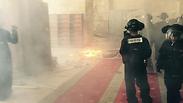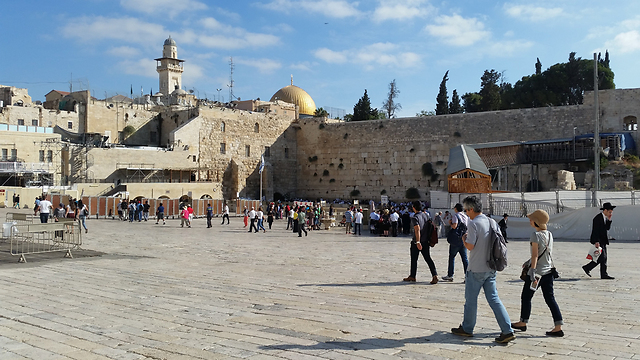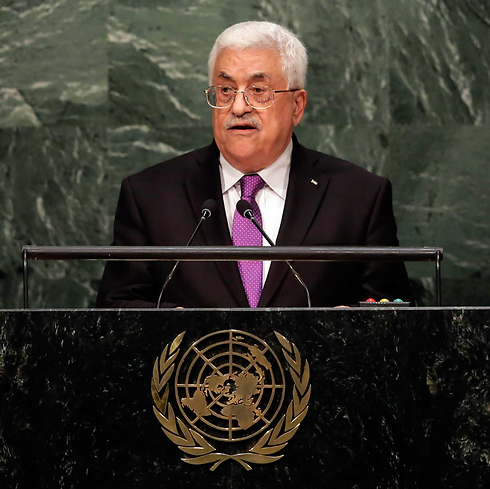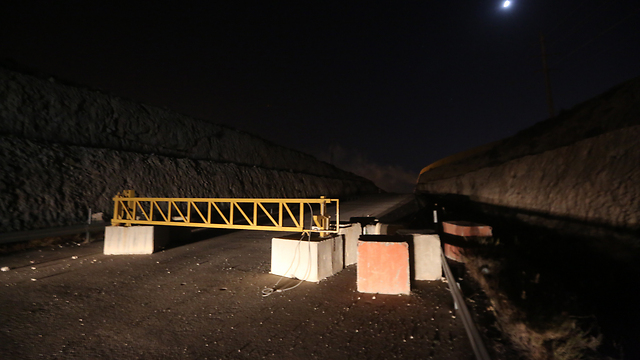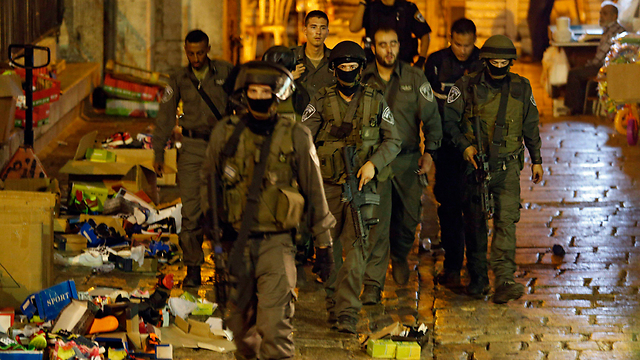
How to save Israel from the Third Intifada
Op-ed: After the stabbing terrorist attacks in Jerusalem it is necessary to take dramatic steps to minimize friction between Jews and Arabs. In addition, unusual diplomatic steps need to be taken, such as a complete, if temporary, curfew at the Temple Mount.
It does not actually matter if we are in the midst of the Third Intifada or are just sliding into it quickly. What is important right now is to stop the escalation that led to the deadly stabbing attack Saturday in the Old City. And in order to do so one must calm the area by reducing the friction between Jews and Palestinians in Jerusalem and in the West Bank.
Alongside military measures required for conflict prevention, the political measures taken should be unconventional. For example, convening a direct meeting between Abbas and Netanyahu. Not to discuss resolving the Israeli-Palestinian conflict, but to discuss a de-escalation.
Americans should be involved in this meeting and press both sides to comply with it. Such a meeting, if held behind closed doors, is closed to the media, and conducted in a businesslike way, can yield immediate results, at least in the West Bank, and perhaps also in East Jerusalem.
Such a meeting would reduce the tension and lack of a political horizon, but there is also a danger: If it fails, it could inflame the situation. The Americans should ensure that the meeting does not fail and bring all their influence to bear on both sides.
It must be noted that a pre-Third Intifada situation justifies unconventional measures. Current events can be called "the intifada of youth under the influence of radical Islam," but it can and must be prevented, and the Israeli government, if it acts together with the Palestinian Authority, may be capable of achieving the desired result.
One must not listen to extremists on both sides, and especially not respond to the demands of Bayit Yehudi and the settler leadership, because if the government gives in to them, friction will increase and flames will be fanned. The security cabinet that will convene after the High Holy Days should rise above narrow political considerations and coalition rivalries and calm the situation before it becomes irreversible.
Before detailing what measures should be taken, it is worthwhile to examine the causes of the escalation and its geographic reach. In fact, Jerusalem and the West Bank are not one bloc. They are different and therefore the treatment of the violent escalation in each area has to be different.
What's behind the situation in Jerusalem is the Temple Mount issue, which was manufactured as a provocation by the northern branch of the Islamic Movement in Israel and spread like fire in the Muslim world as if it were God's truth.
The attacks in Jerusalem are largely a result of frustrated young Palestinians' heated passions. They are frustrated not only by what they consider to be Israeli harassment at the Temple Mount, but also because of incitement by Hamas and the Palestinian Islamic Jihad, and because of the economic and social situation of East Jerusalem Arabs.
In the West Bank, it’s more a case of attempts by organizations such as Hamas, Islamic Jihad, and the Popular Front for the Liberation of Palestine (PFLP) to commit terror attacks in order to ignite a conflict between Israel and the Palestinian Authority.
Most of these attempted terror attacks have been foiled in recent years by Israeli security forces, who caught the perpetrators in time – mostly in the Judea areas but also in Samaria – but there have also been squads of terrorists who have slipped through, as well as individuals who were incited by incidents at the Temple Mount.
As a general rule, you can observe that Palestinians in the West Bank aren’t yet interested in having an intifada, or even a regular escalation of the conflict that will subside after a few days. But the presence of many Israeli tourists during the High Holy Days period creates a friction, as well as a wave of incitement, and efforts by Palestinian Islamist organizations, as well as the reawakened PFLP, are paying off.
What’s needed now, before we search for long-term solutions – which it’s doubtful we’ll reach in the near future – is to bring quiet to the streets, urgently. After seeing that an increased police presence doesn’t necessarily prevent murders, we need to establish a curfew in Jerusalem. Jews on their way to the Western Wall will go through the longer path, avoiding the Old City. There’s no avoiding a total curfew in the Old City and neighborhoods that have experienced violent protests, mostly along boundary areas, at least until after Simchat Torah.
The goal here isn’t to punish the East Jerusalem merchants, but merely to prevent a friction that has proven dangerous.
We also have to shut down the Temple Mount area – to members of all religions, without exception. There will be no prayers there, at least until next Sunday. In boundary areas, police presence will be reinforced, and East Jerusalem Palestinians will be prevented from going into West Jerusalem until after the holiday ends.
These steps aren’t intended to punish the Palestinian population, but to calm the situation. A curfew is a strict measure, but sometimes in order to prevent casualties you have to take tough steps.
Drones in the West Bank
In the West Bank, preparations should be made, especially along major roads and at night, with IDF forces checking suspect vehicles, mostly those of Palestinians but also of Jews. The goal is preventing terror attacks and revenge attacks. These checkpoints will remain in place be and accompanied at night by armored vehicle patrols in danger-prone areas.
In addition, a wider use of unmanned drones with night vision capabilities is in order. These drones will fly above and along the probable danger zones. These, in conjunction with the checkpoints and patrols, might yield excellent results. For instance, preventing stone and Molotov cocktail throwing simply by detecting ambushes and stopping vehicles that go near them, but the bulk of work needs to be done on the intelligence side.
We need to admit: Part of the problem these days is Abbas’s loss of control in the area. It’s not just Israel that has a hard time enforcing the law. Abbas has a harder and harder time governing in the A areas, and especially in the refugee camps, where he’s supposed to be the main ruler. Palestinian security forces have a harder and harder time reaching results, but Abbas could also calm the people down if he wanted to. He could give a speech where he explained to the Palestinians what will happen if the situation continues to escalate.
And a last step, of which Abbas is very afraid, is the re-arrest and imprisonment of those who were released in the Gilad Shalit prisoner exchange. That is, those who have violated the conditions of their release, and they’re not hard to find.
And a last step, of which Abbas is very afraid, is the re-arrest and imprisonment of those who were released in the Gilad Shalit prisoner exchange. That is, those who have violated the conditions of their release, and they’re not hard to find.
We need to remember that the goal right now is not to take vengeance on the Palestinians or punish them, but to calm the area down by minimizing the friction. If that’s done in a straightforward manner, it won’t be difficult to explain it to the world. Not aggressively, in protest, but as a clearheaded view of the situation, presenting the means Israel is implementing as a last resort, taken in order to prevent a bloodbath.
And another point: It’s important to emphasize that in the current situation, increasing construction in the settlements will only serve to fan the flames and increase the number of victims.













